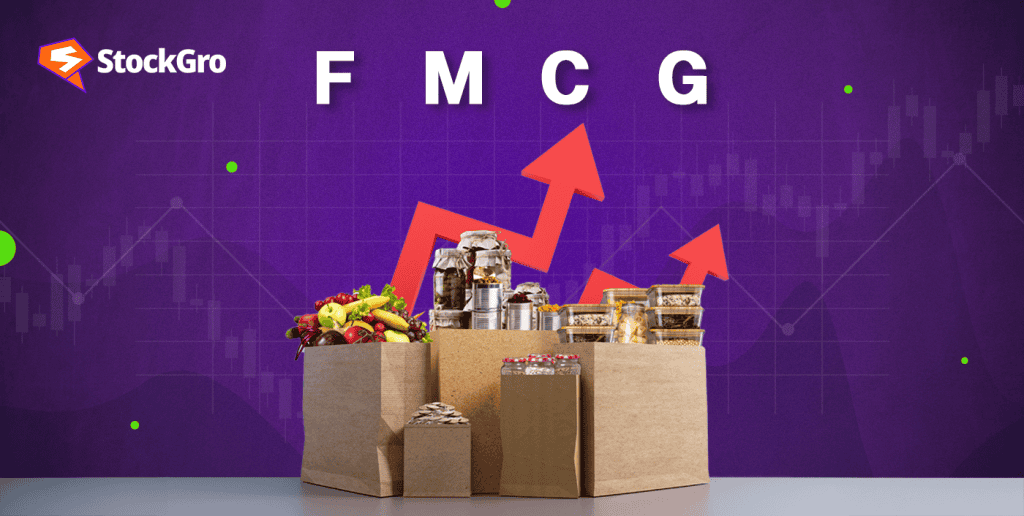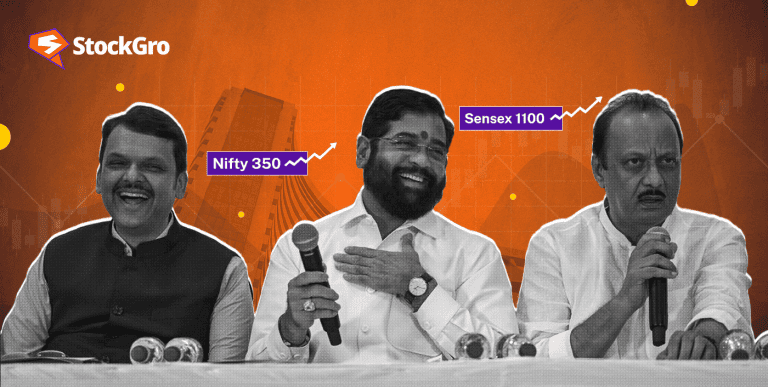
India is witnessing a rise in incomes across all sectors and income groups that directly benefit the consumer sector. The Indian FMCG market was valued at $230.14 Bn. In 2023, it is expected to reach $1288.52 Bn.
FMCG is also called the defensive sector because whether an economy is going through a depression or a boom, people will always need products for daily use. Let us find out the best consumer stocks in India.
Also read: Fast-Moving Consumer Goods (FMCG) Sector- A Safe Haven in Bear Markets?
Understanding the FMCG industry
Millions of people use FMCG products everyday. These products range from biscuits to salt to shampoo. Any product that is perishable and needs to be repurchased for consumption falls under the umbrella of the FMCG sector.
The FMCG sector caters to people living in both urban and rural areas, with 35% of overall revenue coming from the latter. This sector employs 3 million people, accounting for 5% of total factory employment in India.
With its diversified customer base and diversified product portfolio, the FMCG sector in India provides wide reach and appeal.
Key reasons to invest in FMCG space.
- Multiple income streams: The consumer stocks earns its revenues from various retail sources. Companies sell their products via physical outlets, online stores, and exports. This diversified stream of revenues helps in steady growth even if one or two products or channels face problems.
- Expanding rural market: The majority of Indians—roughly 64% —live in rural regions, and they will account for up to 35% of FMCG companies’ 2023 revenues. Another benefit is the sharp increase in per capita income in rural areas.
- Cyclical resilience:The FMCG sector provides essential products that are used every day, irrespective of whether a country is going through a good or bad phase. This sector is immune to market downturns. As a result, it is a wise choice for investors who want to protect themselves from unanticipated market movements. .
- Growing E-commerce: The rise of quick commerce platforms like Zepto and Blinkit gave a good push to FMCG sales. In metro and tier-1 cities, this trend is even more pronounced, with 49 percent and 47 percent of consumers using quick commerce, respectively, for their grocery needs.
Also read: Overview of the e-commerce industry in India
Factors to consider before investing in the FMCG sector.
- Regulatory and policy challenges: Regulatory agencies frequently present difficulties for FMCG companies. One or more of their products can be subject to intervention by FSSAI or by the Ministry of Health and Welfare, etc. These companies are also making a switch towards eco-friendly packaging that requires high initial investment.
- Intense competition and market situation: FMCG companies face intense competition from their peers. Whether that might be in any product line or any consumer base. For example, according to a Ministry of Consumer Affairs report there are more than 700 registered soap brands in India.
- Supply chain disruption: FMCG businesses make use of a vast and wide-ranging logistics network. Maintaining and running this network is a costly affair. Any disruption in this network can lead to a fall in profit margins.
- Expensive marketing: FMCG companies have to advertise their products in such a manner that they reach every corner of the country, and they invest heavily in marketing to make it possible. For instance, in 2023, the consumer sector spent ₹31,000 crores in advertising.
Top 5 FMCG companies to keep on your radar:
Here are the top consumer stocks in India:
- Hindustan Unilever Ltd. (HUL): The biggest FMCG company in India is HUL, with the highest sales and net profits. With its presence in 9 out of 10 Indian households, the company offers more than 50 brands with more than 9mn outlets selling its products. HUL has been around for more than 90 years and employs more than 19 thousand people.
- Nestle India: Nestle India is the second largest corporation in the consumer category. Its products include well-known brands like Maggi, KitKat, Nescafe, and others, and it has more than 10,000 distributors across the country. Dairy products and milk account for 40% of the company’s sales.
Also read: Investment insights: Nestle India and Britannia financials compared
- Varun Beverages Ltd (VBL): The biggest distributor of Pepsi Co. outside the US, with its operations spanning over ten countries, VBL owns 36 domestic and 12 international manufacturing units. The VBL company has a significant presence in South Africa.
- Britannia Industries: Britannia falls under Wadia Group, a famous business house in India. Britannia earns 80% revenue from the biscuits segment and this company sells approximately a million loaves of bread every day in India. 2.8mn retail outlets sell its products.
- Godrej Consumer Products Ltd: Making 40% of its revenue from exports and the remaining 60% from domestic sales, Godrej Consumer is a major player in India. The home care segment is the highest contributor to sales. The company partnered with Walmart & Target in the USA to sell its products.
Here is the financial performance of aforementioned companies in FY24:
| Fundamental metrics (In ₹ Cr) | HUL | Nestle India | VBL | Britannia Industries | Gogrej CP |
| Sales | 61,896 | 24,394 | 16,043 | 16,769 | 3.332 |
| Expenses | 47,237 | 18,581 | 12,326 | 13,603 | 2,607 |
| Profit before tax | 13,926 | 5,289 | 2,739 | 2,913 | 644 |
| Net profit | 10,282 | 3,933 | 2,102 | 2,134 | 451 |
| ROE% | 20.2% | 135% | 35.2% | 57.1% | -56% |
Bottomline:
The FMCG industry may be your first choice if you wish to invest your money with a long-term outlook and minimal risk. Even if you are a high-risk investor, then you should definitely invest a part of your portfolio in the FMCG space to protect your capital from high volatility periods. You must understand your risk appetite and time horizon before investing.
FAQs
1: Which are the top 5 consumer sector stocks ?
The top 5 consumer sector stocks are HUL, Nestle India, VBL, Britannia Industries and Godrej Consumer Products in terms of Market Capitalization. These 5 companies These top 5 companies together have a combined market capitalization of ₹12,00,000 crores. And they together did a combined revenue of ₹1,22,434 crores in FY2024.
2: Which is the best FMCG stock to buy in India ?
The best FMCG stocks to buy in India is HUL. Despite many stock market crashes this stock has remained resilient. The company has never reported a loss. The company is constantly reporting rising Sales and Net profits for the past 10 years. Even during the 2020 Covid era crash HUL’s downside was limited unlike Nifty50.
3: What is the fastest growing FMCG company in India ?
VBL is the fastest growing FMCG company in India. The company reported a net profit of 2,102 crores in the previous financial year which is equivalent to its total sales 10 years ago in 2013. VBL is the biggest distributor of Pepsi co. (outside the USA). Every year the company reports its best performance in Q1 due to the summer season.
4: Which is the biggest FMCG company in the world ?
Nestle SA the parent company of Nestle India is the largest FMCG company in the whole world. With a market capitalization of ₹19,00,000 crores it is bigger than India’s Top 10 FMCG companies combined.
5: Which FMCG company is most profitable ?
The highest amount of profit was generated by HUL. The company reported ₹10,282 crore net profit in FY2024. The company has never made a loss. Followed by Nestle India that holds the second place and made ₹3,933 crore net profit in FY2024.

